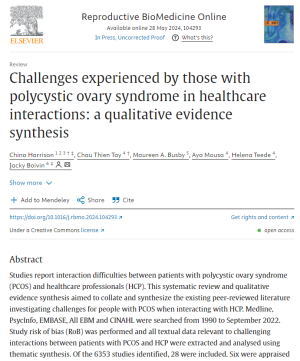People with PCOS experience key challenges when interacting with healthcare professionals
17 July 2024
Interactions with healthcare professionals are often difficult for patients with polycystic ovary syndrome (PCOS) because of medical information not being shared in the best way. A systematic review published in Reproductive Biomedicine Online found that insufficient information about the condition, a lack of support for patient self-management and systemic challenges are also responsible for making interactions difficult.
PCOS affects about 12 per cent of women around the world. It is linked to a variety of health complications such as type 2 diabetes, obesity, irregular periods, infertility, depression, anxiety and abnormal hair growth on the face and body (hirsutism).
Interactions between patients and doctors about PCOS are important for patients to feel supported, learn about their health and make informed decisions. However, researchers found that communicating with healthcare professionals is challenging for patients when news about their diagnosis is shared in a way that doesn’t safeguard their wellbeing. In addition, some healthcare professionals were also seen as cold, curt, or lacking empathy, which stood in the way of effective communication.
The research team also found that not being given information about potential treatments made patients feel like they were being excluded from the decision-making process. This often resulted in patients failing to follow recommendations, as well as a breakdown of trust and confidence in the advice they were given.
Interactions could also be challenging when healthcare professionals prompted but didn’t support a patient’s efforts to find out more about treating and managing their condition. A lack of support led to patients being worried about what they found, making decisions on their own or trying untested or ineffective treatments, without expert support, and at times disengaging from healthcare.
A fourth challenge in interactions with healthcare professionals emerged when people were confronted with system level restrictions or when the restrictions were made worse by how healthcare professionals behaved. Many systemic factors such as policies, organisational culture and a lack of resources were also found to undermine how care was delivered, even for the best healthcare professionals.
Dr China Harrison, lead author, said:
“Our review indicates that the challenges experienced by patients with PCOS when interacting with healthcare professionals could be addressed using well-established and evidenced frameworks for sharing medical news, supporting shared decision-making, and patient activation.
“PCOS consultations could be improved by system level changes supporting the implementation of these frameworks and providing education and training for healthcare professionals.
“Future research needs to examine what frameworks would work best for PCOS care and identify how these could be implemented for all patients while also addressing biases within healthcare interactions due to patient or clinical characteristics.”
Paper
